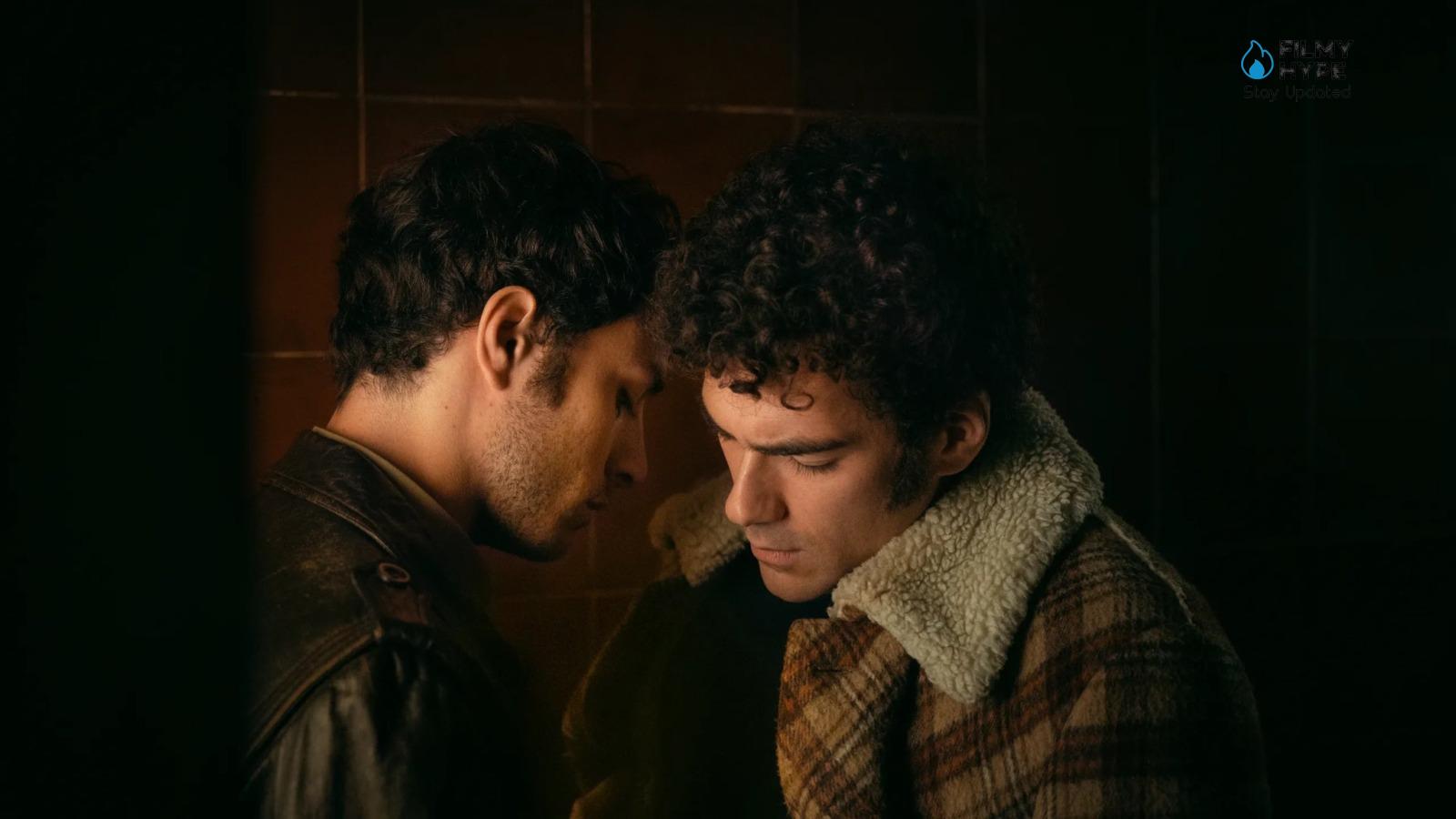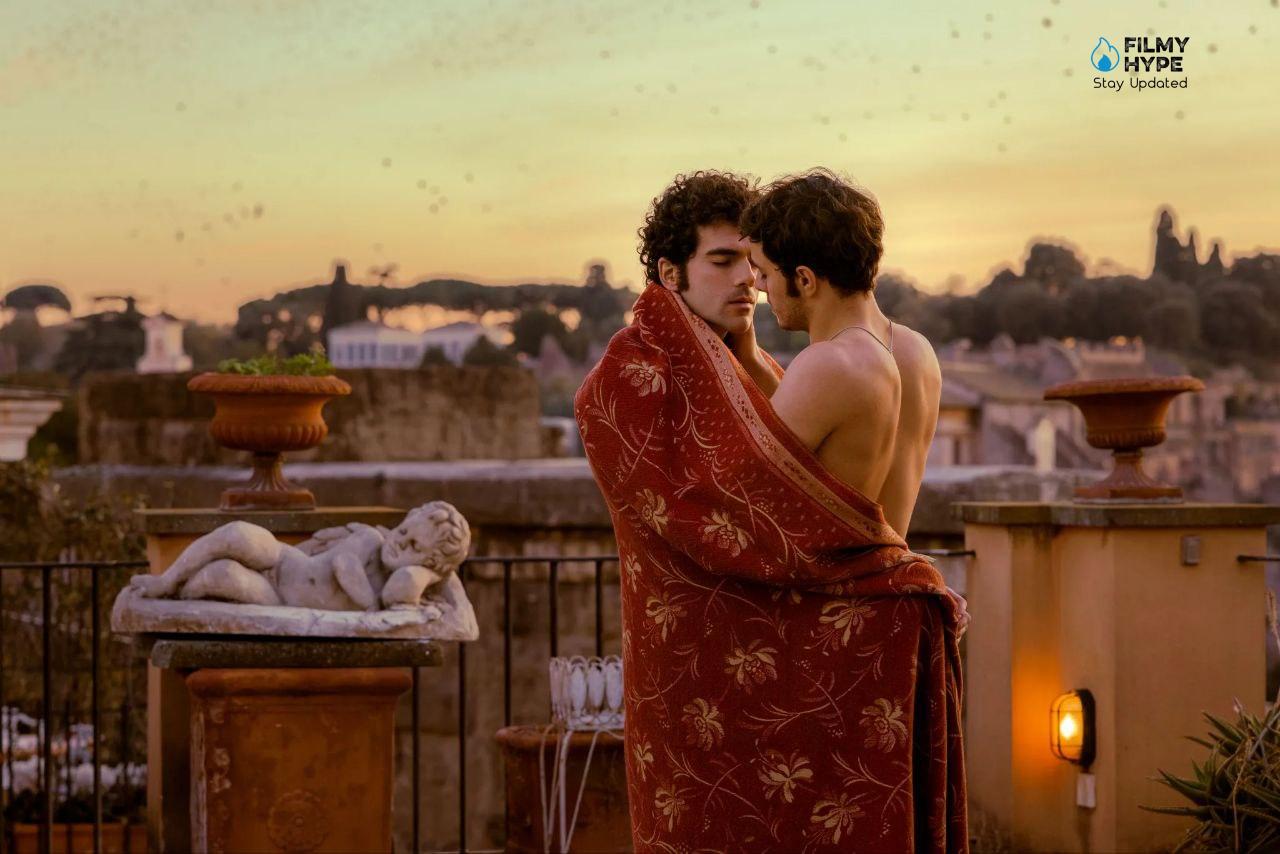Nuovo Olimpo Review: Ferzan Ozpetek Talks to us About a Life and a Cinema
Cast: Damiano Gavino, Andrea Di Luigi, Luisa Ranieri, Greta Scarano, Aurora Giovinazzo
Director: Ferzan Ozpetek
Streaming Platform: Netflix
Filmyhype.com Ratings: 4/5 (four stars)
Nuovo Olimpo, the latest film directed by Ferzan Özpetek and the first that the director made for Netflix, premiered at the eighteenth edition of the Rome Film Fest. The film will be released exclusively on the well-known streaming platform on Wednesday 1 November. It is a cinema that smells of home, of family, that of Ferzan Ozpetek. It is a cinema of glances, understandings, cathartic feelings, relational conflicts, and passions. Of caresses and tears. Above all, it is a cinema in which collectivity, belonging to a community, the beauty of conviviality, and sharing have always had a front-row seat in the audience of its author’s main themes. They constitute his stylistic and content signature, a clear imprint that never fades in all of his work, and which places love at the center. Love declined in all its forms, facets, and contradictions. It is said that the only loves destined to last forever are the impossible ones. You can believe it. You may think differently. One thing, however, is certain, impossible loves, or rather, those that do not have the opportunity to be lived to the full, are the ones we remember forever. And the love told by Ferzan Ozpetek in his new film Nuovo Olimpo is part of this category.

The former is an aspiring director and the latter a medical student, passion immediately erupts between the two. In a high-class house in the center of Rome their love is consummated, laying the foundations for an important relationship. But fate suddenly takes them away. Without having had the opportunity to exchange telephone numbers or addresses, Enea and Pietro seem destined to never meet again. They look for each other among the corridors of the Nuovo Olimpo, among the alleys of Rome, but for decades they cannot find each other. As the years pass, Enea becomes an important director and Pietro begins his career as a surgeon. Aeneas’s first cinematic work romantically recounts the only meeting that took place with Peter that night in the house in Rome. Pietro, accompanied by the woman who is now his wife, sees the film and thinks back with melancholy to that elusive love that they were unable to save from the passage of time. But fate has other surprises in store for them, beyond time and distance.
Nuovo Olimpo Review: The Story Plot
It’s love at first sight that Pietro (Andrea Di Luigi) and Enea (Damiano Gavino) have when they meet on the set of a film in Rome in 1979. They exchange an intense look, and then the second, engrossed in his work, averts it, breaking the magic. But fate has something special in store for them, and soon sees them again at the Nuovo Olimpo cinema, where Pietro enters for the first time to watch old black and white films, soon finding himself in a bathroom with Enea exchanging passionate effusions. Pietro, however, at the beginning is uncertain about what to do, and it is Aeneas who leads him into the game of seduction and starts a love story destined to ignite. Vespa rides, dancing on the terrace, kisses and laughter: the two young boys fall in love within a few days, until Pietro asks Enea for an official date.
The two of them in a Roman trattoria, drinking and eating, to be able to do a simple thing, which, however, is worth more than a thousand words: look at each other. The appointment is made, but Pietro never shows up as he is involved in a demonstration in which he breaks his arm. Years pass, and they grow and move forward while continuing to think about themselves. Aeneas becomes a director, and Pietro a doctor. One lives together, the other is married. They are light years away from each other, but not in their hearts. Yet it seems that life just doesn’t want to see them again. But as Antonello Venditti sings… “certain loves don’t end, they go around immensely and then come back”.

Özpetek with his Nuovo Olimpo tells us the love story between Enea (Damiano Gavino) and Pietro (Andrea Di Luigi). An overwhelming feeling suddenly born from a glance quickly exchanged outside a set in 1978. The film revolves around this intense love and will continue covering a narrative span of thirty years, but in reality, the two protagonists will experience this love for just three days. Enea is a young boy with a passion for cinema who aspires to become a director and studies in Rome to achieve this goal. Pietro, on the other hand, wants to be a doctor and is in the capital because his mother had to undergo a transplant. Their first meeting will take place outside that set, but they will later meet again in the Nuovo Olimpo cinema hall, the place from which the film takes its name. The two will experience an overwhelming passion but as already mentioned, destined to last very short; however, they will never be able to forget themselves.
The story of Aeneas is also partly the story of the director, who, as he says, inserts elements from his life into each film. In this work, which is his most personal among his fourteen, they are more evident and easily identifiable. Unfortunately, however, Özpetek ‘s strong emotional involvement in the events he is telling us with Nuovo Olimpo was not conveyed in the film in the way expected from a director who boasts works of great intimacy and delicacy such as The Ignorant Fairies or most recently the goddess fortune. The passion that Pietro and Aeneas feel for each other is certainly clearly conveyed in the intense love scenes, but it is also perceptible from the looks of the characters who always maintain, despite the passing of the years, a veil of melancholy. Unfortunately, conveying passion and melancholy in the narration of a love story is not enough if these elements lack poetics, poetics that an author like Özpetek had never lacked before, not even in his less successful films.
Nuovo Olimpo Review and Analysis
Nuovo Olimpo, it must be said, has some interesting premises, seems to have all the cards in order, and for the first half hour it also maintains an excellent pace only to then get lost in the narrative in the various time jumps. Time passes markedly between one close encounter and another for thirty years and we on the screen see Pietro and Aeneas grow old without ever being able to see each other again except briefly until the end of the film’s two-hour duration. But in this time the events that follow one another and the narrative devices used are banal, predictable, and already seen in many other films and TV series. It is not difficult to imagine what will happen, and at a certain point, you even come to hope that the predictions are wrong and that the narrative changes and takes another path, a path that it will never take, falling more and more into cliché.
He wants to test new ways of narrating and giving shape to the story, Ozpetek, with Nuovo Olimpo. And he decides to do so by entering the territories of time, which is inexorable here. He divides it, fragments it, and tries to analyze the consequences resulting from the passing years. It is punctuated by a slow rhythm, which almost acts as a counterbalance to the lightning-fast love of Enea and Pietro, who fell in love from the first glance they exchanged on a set where the former is a volunteer. Ozpetek knows he has left his comfort zone by choosing this specific structural operation. There is no longer the temporal compactness of his previous films, and this can be perceived from a lack of narrative solidity in the temporal arcs he tells, four different years that are far apart from each other, small parentheses of a story that, having to become more intense as it progresses, as expected, always appears to remain on the surface, both in feelings and actions, a little shaky in going all the way to the end.

The Turkish director seems to have floundered and struggled quite a bit while trying to manage the narrative, evolutionary, and emotional lines of his protagonists in the various phases of their lives, in particular in the transition from young people to adults. This, once the product was finished, relieved the emotional and romantic tension of the couple after a very convincing first part, which is part of the year that was more constructed and developed than the others (i.e., ‘’79). A shame, given the interesting presentation of the narrative, which, however, is so little in-depth, makes Aeneas and Peter less engaging and convincing than other characters brought to the screen by Ozpetek, despite being pleasant overall. Flaws, therefore, are not lacking in Nuovo Olimpo. But we still have something to appreciate. Yes, because Ozpetek gives us a beautiful love letter to cinema, which is closely linked to the concept of memory.
Pietro and Enea meet on a set, then at the cinema – the Nuovo Olimpo of the title – and when they separate, the latter, having become a director, turns their love story into a film. He imprints his memories of him on the film, transposes them, and imprisons them in the images so as not to let them die. He transforms his feelings into concrete sequences so that neither they nor his relationship can be forgotten. Rather, he ensures that they live forever, in the glow of a room that will warm and at the same time soothe his suffering heart. And Ozpetek wants to tell us in the subtext, isn’t this the function of cinema? Being a treasure chest of memories and passions, making them immortal, ready to resurface and burn whenever the need arises. Because cinema can continue to make you feel a presence even where there is absence; to give you calm and beauty even when there is chaos around you; to rewind the moments and start them again as if they were happening again, even if you turn around at the end credits and what you saw on the screen is no longer next to you.
Cinema is a friend that keeps us company and reassures us, pushes us to believe in the impossible, and helps us overcome difficulties. And it is also a place, understood as a concrete dimension, where everything is allowed, and no one judges you. In transmitting these emotions aimed at the Seventh Art, Nuovo Olimpo works and reaches straight to the hearts of the audience, taking on the guise of a story that is at times meta-cinematographic, in which we intercept the director’s alter ego in Aeneas. A note, we can say, is very positive compared to the screenplay problems found in the film. Ozpetek at the end greets his audience with a sequence that touches the heartstrings and lifts the fate of the film a little: Mina’s melodic voice – a constant presence – embraces and caresses the protagonists for an indefinite time before the lights go off off. The gift that the director gives us is to let us imagine, with a “what if”, what we think the future of the protagonists could be. Making us understand how much we too are part of this wonderful and hypnotic world called cinema.

Cinema as a physical place becomes a representation of a (not past but) different time and life, when falling in love was still beautiful and overwhelming and human interactions were (or will be) the emotional and nerve center of existence. In the comatose, aseptic, and boringly temporal present – in the sense that time is marked chronologically – this has become impossible. The metaphor of the aforementioned process finds a clear confirmation in the cinema, which in the same way as the spaces of everyday life have ceased to be frequented with liveliness and above all to be a point of reference for knowing and opening up to the unknown. This is what happens when the perversion of light (of spotlights) is preferred to darkness and the sublime panic caused by the size of images is replaced by the reassuring miniaturization of screens. Within this cumbersome framework, Ozpetek draws a heartbreaking love story that permeates, surpasses, and destroys time rather than regularly travels through it.
In a riot of events and demonstrations – there is also a political one that causes the initial rupture between the protagonists – bright and blinding – Aeneas at a certain point becomes truly blind, immersed in the director’s most deep-rooted and radical topoi – yes, there is a huge terrace, love (over)lives as the years pass and appears as if hibernated whenever it (does not) (r)exist in the present. The poetry of this lyrical and rebellious song helps to turn a blind eye to some forcing and naivety of the screenplay, which pushes on extremely self-referential keys concerning the needs of the story, but on the other hand in this way strengthens the oscillating, anti-climactic dimension and suspension of the story. The female characters are fundamental and freely dancing, Luisa Ranieri’s Tweety, a deus ex machina ready to give us a ticket to the Nuovo Olimpo. For a new blinding Cinema Paradiso.
Nuovo Olimpo Review: The Last Words
Ferzan Ozpetek returns with a poignant film that talks about life and cinema as timeless places where you can fall in love and (dis)know each other, going through the comatose immobility of a present without intensity. One of the author’s best works, allows itself to be overwhelmed and (in)sings by projecting large, lyrical images over space and time. Nuovo Olimpo is a film capable of reaching the hearts not only of cinema enthusiasts or Ozpetek fans but of all those who have loved in their lives. Nuovo Olimpo is pure romance and having, even if only for a couple of hours, this feeling of amazement, passion, disappointment, melancholy, and nostalgia is a true wonder.







